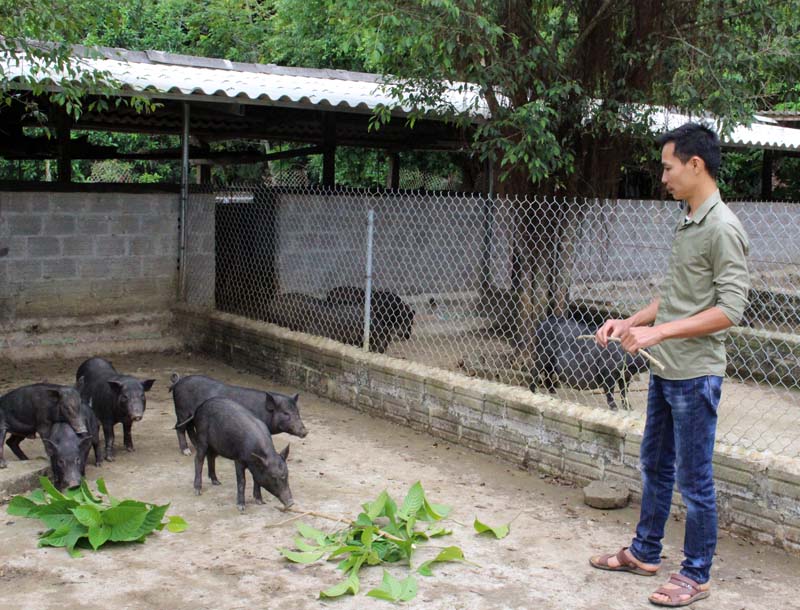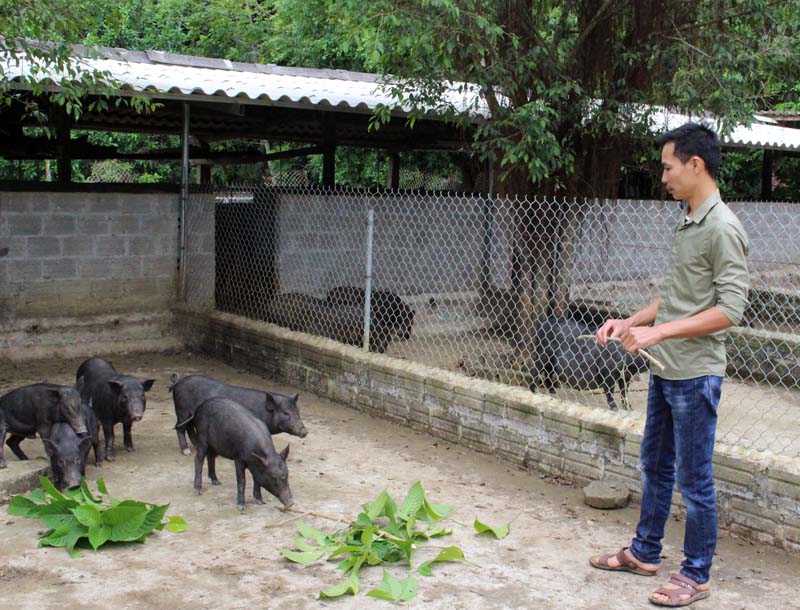
(HBO) – An 8X guy Bui Huy Chuong, 1984, in Minh Son village, Yen Tri commune (Yen Thuy) started to make his passion of producing clean food to provide for consumers.

Bui Huy Chuong, Minh Son village, Yen Tri
commune (Yen Thuy) use herbs as food to limit the disease to wild boars.
In 2013, Chuong began to implement the model
of raising wild boars. His initial fund was more than 100 million VND to build
facilities and buy breeding pigs. According to Chuong, the most difficult thing
is choosing the standard breeding pigs. Therefore, he did not hesitate to go to
Lac Son and Luong Son districts to buy standardized sows. Each of 3 mother pigs
gave birth to 8 pigs, then he continued to select the standard pigs to breed,
he sold the rest as commercial pigs.
After 5 years, now Chuong's economic model
consists of more than 2 hectares of 14 pig cages and a pond surface of 3,600
m2, the rest is the planting land. At present, Chuong has 11 sows, 50
commercial pigs; 0.5 tons of fish with varieties, such as hypophthalmichthys,
carp, grass amurs, etc. Each year, reducing the investment costs, his clean
production model brought about 200 million VND in profit.
The price of 1 kg of wild boar varies from
120,000 to 130,000 VND. Even on the Lunar New Year occasion, Chuong did not
have enough products to sell. Many companies want to sign long contracts in
large quantities but he dares not to sign because he cannot make enough supply
for businesses. The clean forest boar brand is famous throughout and outside
the province. Despite the limited number of clean pigs, Chuong can only provide
for familiar traders who come and buy directly at his house.
So where is the decisive element of the clean
pig brand of the 8X guy. Mr. Bui Huy Chuong shared the secret: To succeed and
have a firm place in the market, the first thing is to create clean products,
good quality, meet the requirements of consumers. To make better quality of the
pork, I am interested in food sources. I have researched and applied microbial
fermentation process from rice and corn bran that Yen Thuy people made. In
addition, I invested in growing herbs to feed pigs to provide protein and
prevent many diseases, strengthening resistance to animals.
According to data from the Hoa Binh Provincial Party Committee, the industrial production index for the first six months of 2025 is estimated to have increased by 20% compared to the same period last year. This marks the highest year-on-year growth rate for this period since 2020.
In the first six months of 2025, Hoa Binh province’s export turnover was estimated at 1.145 billion USD, marking an 18.11% increase compared to the same period in 2024. Import turnover was estimated at $ 804 million, a 17.15% increase, which helped the province maintain a positive trade balance.
The lives of the ethnic minority farmers in Tan Lac district have gradually improved thanks to the new directions in agricultural production. This is a testament to the collective strength fostered through the professional associations and groups implemented by various levels of the district’s Farmers’ Union.
With the motto the "product quality comes first,” after nearly one year of establishment and operation, Muong village’s Clean Food Agricultural and Commercial Cooperative, located in Cau Hamlet, Hung Son Commune (Kim Boi district), has launched reputable, high-quality agricultural products to the market that are well-received by consumers. The products such as Muong village’s pork sausage, salt-cured chicken, and salt-cured pork hocks have gradually carved out a place in the market and they are on the path to obtaining the OCOP certification.
In the past, the phrase "bumper harvest, rock-bottom prices" was a familiar refrain for Vietnamese farmers engaged in fragmented, small-scale agriculture. But today, a new spirit is emerging across rural areas of Hoa Binh province - one of collaboration, organisation, and collective economic models that provide a stable foundation for production.
Maintaining growing area codes and packing facility codes in accordance with regulations is a mandatory requirement for agricultural products to be eligible for export. Recently, the Department of Agriculture and Environment of Hoa Binh province has intensified technical supervision of designated farming areas and packing facilities to safeguard the "green passport" that enables its products to access international markets.



